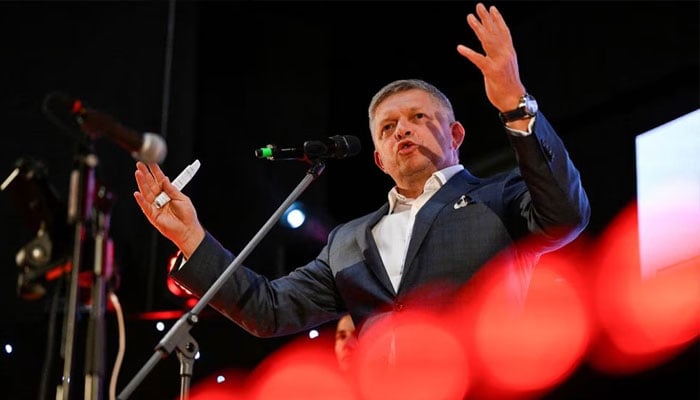

In a concerning development for the West, Slovakia’s pro-Russia former prime minister Robert Fico, who campaigned on a promise to cease military aid to Ukraine, has emerged victorious in the recent election.
As the results stand, with 99.98% of voting districts accounted for in the Saturday election, Fico’s SMER-SSD party secured nearly 23% of the vote. In second place was the Progressive Slovensko (Progressive Slovakia, PS) party, with nearly 18% of the vote.
This outcome places Fico in a strong position to initiate discussions aimed at forming a government, while a liberal rival has expressed intentions to seek alliances in order to thwart Fico’s return to power.
Assuming Fico secures a political mandate from President Zuzana Caputova to attempt to build a majority coalition and establish a government, this would have significant implications. A government led by Fico and SMER-SSD could potentially align Slovakia with Hungary in challenging the European Union’s consensus on supporting Ukraine when the EU seeks to maintain unity in its stance against Russia’s invasion.
The election outcome, where SMER-SSD may need coalition partners to govern, positions the moderate leftist HLAS (Voice) party, which finished third, as a key player in the process. HLAS leader Peter Pellegrini, who has previously indicated policy alignment with SMER-SSD, emphasised the importance of seeking a stable coalition and prioritising the policy agenda during negotiations, which could extend over several days or weeks.
Seven political factions have met the electoral threshold to secure seats in the upcoming parliament. As the party with the highest vote share, SMER-SSD is likely to receive the first opportunity to form a government. It may look to the nationalist, pro-Russian Slovak National Party and HLAS for the necessary support to achieve a majority.
It is worth noting that HLAS did not make Ukraine a central campaign issue, with a focus on ammunition supplies for Slovakia’s defence industry. Their party program also supports a united EU stance against Russia’s invasion of Ukraine.
A government led by Fico would signify a further shift away from political liberalism in central Europe, a trend that could be amplified if Poland’s ruling conservative Law and Justice (PiS) party also succeeds in an upcoming election.
Fico has established close ties with Hungary’s leader, Viktor Orban, who congratulated Fico on his victory via social media. Orban’s message suggested a willingness to collaborate, emphasising their shared patriotic values and opposition to what they view as the imposition of social liberalism from Brussels.
PS, a liberal party advocating for green policies, gender rights, deeper European integration, and human rights, is also considering forming a coalition with HLAS.
PS leader Michal Simecka expressed concern about SMER-SSD’s victory, stating it was “very bad news for Slovakia” and pledging to do everything possible to prevent Robert Fico from ruling Slovakia.